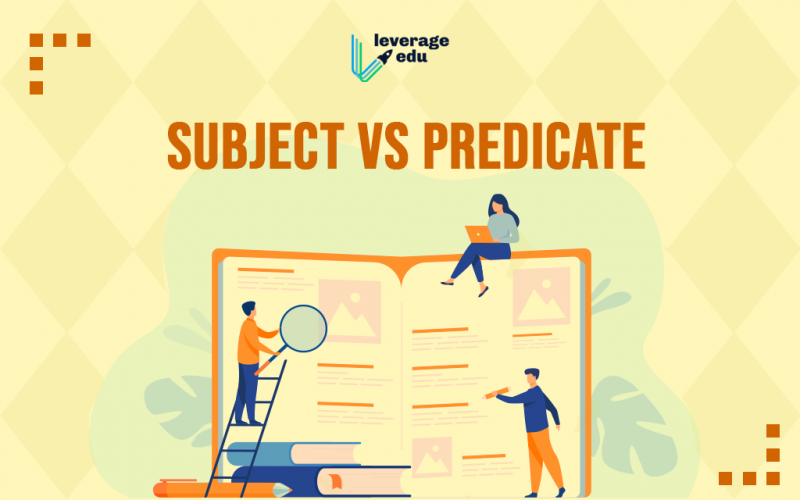Subject vs Predicate: Every day, we all write something, whether it’s a text message, a report, or an email. As a result, we all create sentences that are made up of various components. There are various pieces of sentences, to be sure. What’s more, guess what? Learning the names of the different sections of a sentence will show a grasp of the language and your English vocabulary.
In this blog, we will study subject vs predicate along with some fun practice questions. So if you want to ace the subject vs predicate section in your English school exams or need to polish it again after school, then don’t forget to read this blog till the very end and practice with us.
This Blog Includes:
Subject vs Predicate
By the time children reach elementary school, they learn about the various parts of a sentence. These parts give a role to each term. A subject and a predicate are required for any complete sentence. But what are they, exactly? What is subject vs predicate? Let’s have a look.
Subject
The subject of a sentence is who or what performs the action denoted by the verb; in other words, the subject tells us who or what performs the action denoted by the verb. To find the subject, look for the sentence’s main verb first, then ask the question “who” or “what.”
Predicate
The subject’s behavior is indicated by the predicate. The predicate’s main verb is the most important element. Predicates must always have a verb. They do, however, contain a couple of other components. The verb, direct object, and all other clauses or phrases are examples of these components. (ambien)
Must Read: Best Novels to Improve English
Subject vs Predicate: Types of Subjects & Predicates
Till now, we have understood the basic difference between subject vs predicate. Now, let us see the classification of them:
Simple Subject
The simple subject refers to a part of the sentence which has only a subject.
For example,
Radhika was going to the hospital.
- “Radhika” is a simple subject.
Complete Subject
The complete subject is referred to the part of the sentence that has a subject with a modifier.
For example,
This yellow book has 300 pages.
- “Yellow Book” is the completed subject as it gives a complete introduction to the subject.
Compounded Subject
The compound subject refers to the part of the sentence that has two or more subjects joined with the help of a conjunction.
For example,
Dushyant and Priyanshu are coming to meet us.
- “Dushyant and Priyanshu” are an example of the compound subject.
Simple Predicate
A simple predicate is known as the part of the sentence that has only a verb.
For example,
This yellow book has 300 pages.
- “300 pages” is an example of the Simple Predicate.
Complete Predicate
A complete predicate is referred to the part of the sentence that has verbs with a modifier.
For example,
Harsh always quarrel over little things.
- “Quarrel over little things” is the complete predicate here.
Compounded Predicate
A compounded predicate is the part of the sentence that has two or more verbs with a conjunction.
For example,
Anju likes white chocolates, but hates dark chocolates.
- “Likes white chocolates but hates dark chocolates” is an example of Compounded Predicate.
Subject Vs Predicate: Let’s Practice
Now after all that theory on a subject vs predicate, let us now actually see how the theory can be applied into practice. Here, we have given you some questions on a subject vs predicate to practice.
Questions
- The moon was looking graceful.
- The dogs were barking fiercely.
- The pretty girl was wearing a yellow frock.
- My elder brother serves in the army.
- Cherin and Natasha are working in their garden.
- My mother and my uncle are trained, classical dancers.
- You don’t have to wait for me.
- We can not wait for more trouble.
- The little tree was covered with green leaves.
- A kind merchant was passing by the shoemaker’s window.
Answers
- The moon (subject) was looking graceful (predicate)
- The dogs (subject) were barking fiercely (predicate)
- The pretty girl (subject) was wearing a yellow frock (predicate)
- My elder brother (subject) serves in the army (predicate)
- Cherin and Natasha (subject) are working in their garden (predicate)
- My mother and my uncle (subject) are trained, classical dancers (predicate)
- You (subject) don’t have to wait for me (predicate)
- We (subject) can not wait for more trouble (predicate)
- The little tree (subject) was covered with green leaves (predicate)
- A kind merchant (subject) was passing by the shoemaker’s window (predicate)
Must Read: 145+ Examples of Simile for Everyday Usage
FAQs
The subject is the part of the sentence that typically performs the action or is the focus of the sentence. It usually consists of a noun, pronoun, or noun phrase.
The predicate is the part of the sentence that provides information about the action, state, or characteristics of the subject. It usually includes the verb and may also contain other elements like objects, complements, or modifiers.
To identify the subject, ask yourself “Who?” or “What?” before the verb. To identify the predicate, ask “What is happening?” or “What is being said about the subject?”
Candidates taking different government exams can be asked questions based on the subject vs predicate in the general English section. We hope we were able to clear your doubts on a subject vs predicate. It was a super fun and learning exercise. Wasn’t it? If yes, then for more educational content, stay connected with Leverage Edu.

 One app for all your study abroad needs
One app for all your study abroad needs
























 45,000+ students trusted us with their dreams. Take the first step today!
45,000+ students trusted us with their dreams. Take the first step today!


